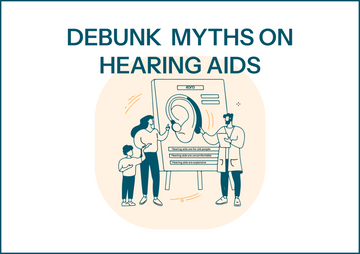Hearing loss is often an invisible battle that many individuals face daily. While the physical aspects of hearing loss are frequently addressed, the emotional and mental health consequences are less commonly discussed. The aim of this article is to shed light on how hearing loss can significantly affect mental well-being, often leading to conditions such as anxiety and depression. This knowledge is crucial, especially in a world where solutions like OTC hearing aids are becoming more accessible.
The Connection Between Hearing Loss and Mental Health
Research has established a strong correlation between hearing loss and mental health issues. People experiencing hearing loss may often withdraw socially to cope with their challenges, which can lead to feelings of isolation and loneliness. When testing ongoing encounters with hearing impairments, the emotional toll becomes clearer.
Social Isolation as a Consequence of Hearing Loss
When individuals struggle to hear, they naturally become less engaged in conversations. This withdrawal can cause a ripple effect on mental health:
- Withdrawal from Social Activities: Social outings where communication is essential may become daunting, prompting withdrawal from friends and family.
- Decreased Interaction: Couples and family members often find communication strained, leading to disagreements and misunderstandings.
- Increased Loneliness: Many individuals with hearing loss report heightened feelings of loneliness, as they may miss out on shared experiences.
The Psychological Effects of Hearing Impairments
The psychological effects of hearing loss extend beyond mere discomfort or inconvenience. The emotional distress stemming from communication barriers can manifest in various detrimental ways.
Impact on Self-Esteem
People with hearing loss may struggle with confidence levels. They could feel embarrassed or ashamed, fearing judgement from others. This self-doubt can hinder opportunities for personal and professional growth.
The Role of Tinnitus
Linked with hearing loss is a condition known as tinnitus, a persistent ringing or buzzing in the ears. Tinnitus can significantly affect mental health as it often adds to anxiety:
- Increased Stress Levels: The constant noise can lead to increased levels of stress and frustration.
- Sleep Disturbances: Many individuals find it challenging to fall asleep due to the noise, resulting in fatigue and irritability.
Seeking Help: The Importance of Consulting an Audiologist
Addressing hearing loss is fundamental to improving overall mental health. Consulting an audiologist can provide the necessary evaluations and guidance. Audiologists specialize in diagnosing and treating hearing loss, and they play a key role in guiding individuals towards appropriate solutions.
Benefits of Early Intervention
Early intervention can significantly mitigate the mental health consequences associated with hearing loss:
- Improved Social Engagement: By addressing hearing issues, individuals can reintegrate into social circles and feel comfortable participating in conversations.
- Enhanced Communication Skills: Audiologists can offer strategies for improving communication, thus reducing misunderstandings among friends and family.
The Rise of OTC Hearing Aids: A Beacon of Hope
In recent years, the introduction of OTC hearing aids has transformed the landscape for those with hearing loss. Unlike traditional hearing aids, these devices can be obtained without a prescription. This accessibility is crucial for many individuals who may feel overwhelmed by the healthcare system or hesitant to seek help.
Redefining Accessibility
The availability of OTC hearing aids lowers the barrier to entry for many individuals struggling with hearing loss. Here are some key benefits:
- Cost-Effective Solutions: OTC options usually come at a lower price point, making them more accessible to the average consumer.
- Self-Assessment: Many individuals prefer the autonomy of selecting their devices after a basic self-assessment of their hearing difficulties.
Building a Support Network
One of the most overlooked aspects of dealing with hearing loss is the importance of a supportive network. Friends, family, and support groups can play a pivotal role in combating negative emotions and promoting mental wellness.
Engagement with Peers
Joining support groups can be beneficial for emotional healing. Engaging with peers who face similar challenges can provide a sense of belonging and understanding:
- Shared Experiences: Connecting with others allows individuals to voice their thoughts, feelings, and concerns regarding their hearing loss.
- Helpful Resources: Many support groups share valuable resources and coping mechanisms that can improve mental health.
Incorporating Healthy Coping Mechanisms
Managing mental health issues related to hearing loss requires active interventions and coping strategies. Here are some effective methods individuals can integrate into their lives:
Practicing Mindfulness
Mindfulness can significantly reduce stress and anxiety. Simple exercises such as focused breathing, meditation, or yoga can cultivate inner peace and greater emotional resilience.
Maintaining a Healthy Lifestyle
A well-balanced diet and regular exercise have lasting effects on mental well-being. Substantial evidence suggests that physical activity releases endorphins, which can boost mood.
Therapy and Counseling
Speaking to a trained therapist provides a safe space to address feelings of loneliness, frustration, and sadness. Cognitive-behavioral therapy (CBT) has proven effective in treating issues related to chronic health conditions, including hearing loss.
Staying Informed: Knowledge is Power
Understanding hearing loss and its effects on mental health empowers individuals to take charge of their wellness. Whether it's learning more about the latest in audiology or seeking information on OTC hearing aid advancements, knowledge stands as a powerful tool.
Resources and Support Groups
With the digital age at our fingertips, individuals can access a myriad of resources online. From educational articles to YouTube videos, there is a wealth of information available:
- Online Forums: Many platforms host discussions where individuals share their experiences.
- Health Websites: Websites like the American Speech-Language-Hearing Association offer research-based articles.
Empowering Yourself and Others
Those suffering from hearing loss should remember that they are not alone. With proper support, resources, and interventions, the emotional burden can be diminished. Open conversations about these issues can elevate awareness and foster understanding within communities, ensuring that those with hearing loss receive the compassion and help they deserve.
As we continue to explore solutions for hearing loss, let’s reinforce the idea that mental health is just as vital as physical health. By treating hearing loss with the seriousness it deserves, we create a healthier, more inclusive society where individuals can thrive.

























